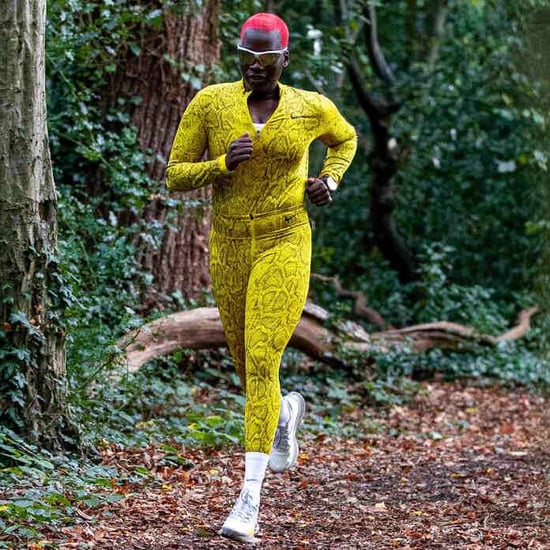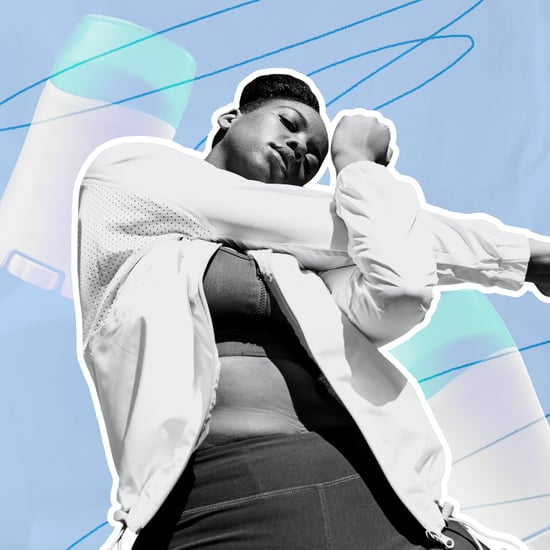Can Smiling Make My Workout Better?
Science Says Smiling Makes Your Workouts Better, So I Gave It a Shot

I'm all about quick fixes that make workouts more effective, and if there's a trick to make a workout seem easier, I've probably tried that too. Those things don't usually come packaged together, but science may have hit the jackpot, and it has nothing to do with physical form or mental mantras. Nope, it's just smiling.
There's already evidence to suggest that smiling can trick your brain into thinking that you're happy, triggering the release of feel-good hormones such as dopamine and serotonin that can lift your mood in reality. A 2017 UK study tested the benefits of smiling in a fitness capacity, and their findings suggest that smiling can actually help you perform better during workouts.
Researchers tested the trick by asking groups of runners to jog while smiling, frowning, relaxing their upper body, or using their usual mental workout strategies. As the participants ran, scientists measured how much oxygen they used per stride (their "running economy"), with lower numbers showing a more efficient workout.
The study was small, with 24 participants, but results showed that the runners who smiled were the most efficient. That group also reported lower "perceived effort" than the frowning group, meaning that they didn't feel they had to work as hard. So, what's behind the results? Lead researcher Noel Brick told the New York Times that smiling probably leads to overall muscle relaxation, which in turn leads to better overall performance.
One interesting caveat: according to Brick, the more forced your smile is, the less likely you are to relax and activate those performance gains. Genuine smiles, the ones that light up your eyes, brighten your cheeks, and feel the most natural, are your best bet to having a better workout and feeling better while you do it.
It sounds like a strange trick, but some of the best athletes in the world have used it. Champion marathoner Eliud Kipchoge smiled through the last few miles of his two-hour, 25-second marathon in May 2017, the fastest 26.2 ever. He was smiling, he told Wired, in hopes of relaxing himself and dealing with the pain.
Testing With Runs and HIIT
I can modestly say that I'm no record-breaking marathoner, but if the best in the world are trying it, and if science is confirming it, I'm willing to try out any weird-sounding trick. Mimicking the study, I first tried smiling through the pain on a few hot, hilly, 10-mileruns this Summer. Specifically, I used it when I hit a "here goes nothing" moment, like a steep incline or a long, shadeless stretch of sidewalk: something that seemed impossible or that I knew would be painful. These were the moments when I felt so crazy ("Why am I doing this to myself, again?") that I just had to smile, or almost laugh at myself. That made it feel genuine and weirdly empowering. It wasn't that that I suddenly knew I could conquer that hill, or even that I suddenly wanted to; it still felt impossible, and I definitely still wanted to stop. But it gave me a "throw caution to the wind" mentality that was enough to get started.
I tried grinning during the toughest moments of HIIT workouts— lunge jumps, squat jumps, burpees, and any other time I wanted collapse on the floor — and found the same result. It felt strange, because smiling was the last thing I wanted to do in those situations, but it also gave me an unexpected jolt of energy and confidence. I couldn't track my oxygen efficiency like in the study, but the workouts and runs just felt better: less work, but also more fun. And I'm a firm believer that the best workouts are the ones you'll stick to, and that the ones you'll stick to are the ones you enjoy.
I will say, it definitely feels awkward at first. If you don't feel like you can spontaneously sport a genuine smile mid-workout, try streaming a funny video on the treadmill, listening to a funny podcast or comedian, or smiling when a class instructor says something hilarious (or tells you to do something that seems hilariously impossible). Performance gains and efficiency are great results, and if smiling during a workout can also make it seem easier and more fun, then it might just be worth a try.






